 Research Update
Research Update
02
November
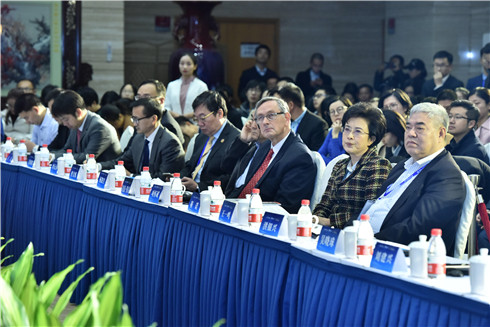
On 28th October, "Chinese Economy and International Cooperation" Annual Conference and the new" Bashanlun"meeting 2017--China and the World after 19th CPC National Congress was held in the Shiji Stadium in Renmin University of China (RUC). The conference was co-hosted by Renmin University of China, the new "Bashanlun" Forum and the International Cooperation Center of the National Development and Reform Commission, jointly organized by the National Academy of Development and Strategy (NADS) of RUC and the Chongyang Institute for Financial Studies, specially supported by China Society of Economic Reform and Cairncross Economic Research Foundation. The meeting adheres to the spirit of the "Bashanlun meeting", brings together all the elite both at home and abroad, exchanges in-depth ideas, working together to solve the difficulties encountered in the process of China's economic development and explore new development opportunities.
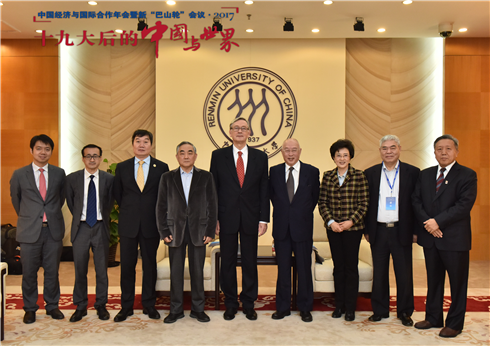
On the afternoon of Oct. 28, Jin Nuo, Secretary of the Party Committee of Renmin University of China and Chairman of NADS, attended the opening ceremony, met with the attendees and took photoes.

Wu Xiaoqiu, Vice President of RUC, moderated the opening ceremony.
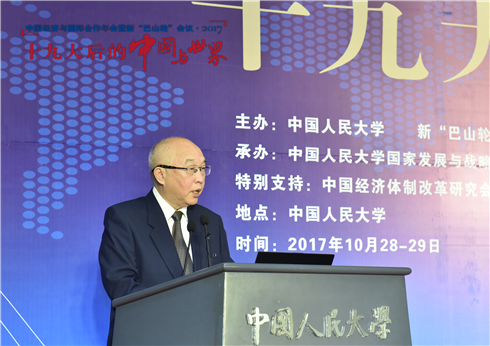
Xiang Huaicheng, Former Finance Minister and President of new "Bashanlun" Forum, said that before 1985 "Bashanlun" meeting, China has to learn the experience from socialist countries. This meeting made us realize that western countries with free market had a lot of things worthwhile learning. After 32 years, new "Bashanlun" meeting was held in RUC with the topic of "China and World after 19th CPC National Congress", which is closely following the pulse of the times and coming at the right time.
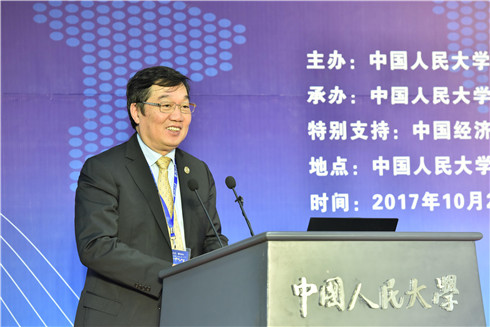
Cao Wenlian, Director of International Cooperation Center of National Development and Reform Commission and Executive President and Secretary-general of new "Bashanlun" Forum, mederated the speech session on the afternoon of Oct. 28.
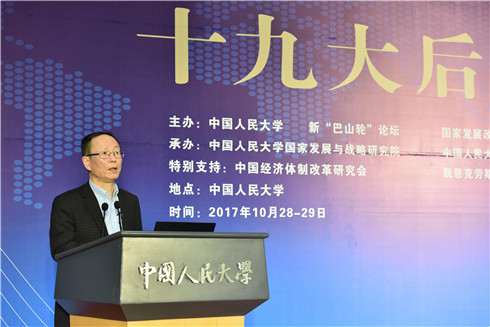
Wang Yiming, Deputy Director of Development Research Center of the State Council, said that China's economy growth will continue the moderate-high speed trend since the new formal appears. Quality and efficiency will become a major theme of economic development.
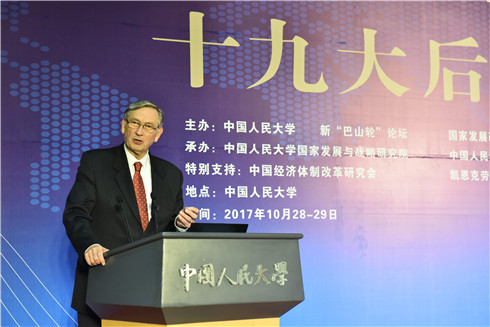
Danilo Turk, Slovenia's former president, pointed out that China needs to be careful to manage new changes, which means on the one hand, it should manage the high-speed growth, on the other hand , it should protect the fair distribution and pay attention to income inequality and income gap.

Hong Yinxing, Former Secretary of the Party Committee of Nanjing University, said that the principle of "going out" for China's enterprises should apply for the value chains, one is dominated by high-end technology, the other one is processing links transfer.
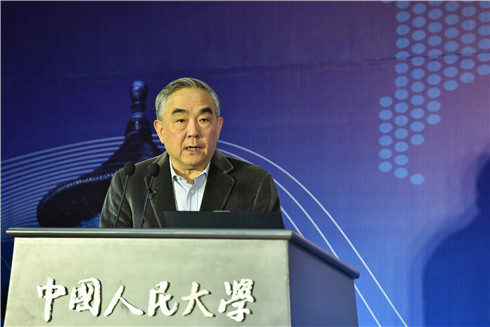
Yang Kaisheng, Former Governor of ICBC, emphasized that we need to pay more attention and improve supervision to general operational condition and risks and favors of financial industry.
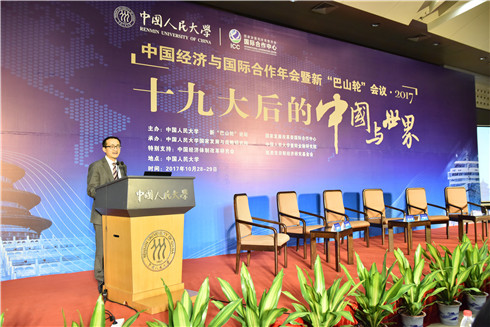
On Oct. 29, Liu Yuanchun, Vice President of RUC and Executive Dean of NADS, moderated the meeting.
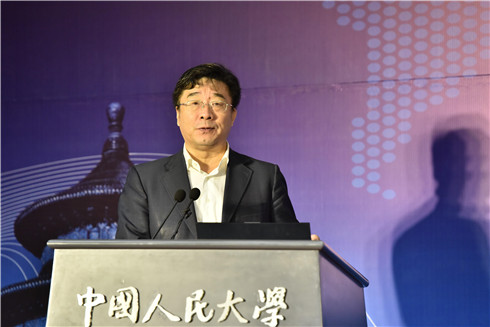
Liu Wei, President of RUC and Dean of NADS, said in the opening remarks that today, China is also in a critical period of economic reform, facing the problems of accelerating supply-side reform, solving develioment unbalance and guarding the red line of systemic financial risk, for which scholars, experts and government officials should offer advice and suggestions to build China's modern economic system. New "Bashanlun" meeting is deperately needed to help us think and explore the future and bear the historical responsibility. Liu Wei pointed out that high-level think tank construction is not only meeting the requirments of enhancing the soft power under the background of new era and new contradictions , but also providing a strong intellectual support for us to respond to increasingly complex environment, to promote the ruling in accordance with the law, scientific governance, strengthen the exchange and cooperation between theoreticalists and practitioners and set up a bridge between "knowledge" and "endeavor".
Cao Wenlian, Director of the International Development Center of the National Development and Reform Commission and the Executive Chairman and Secretary-general of the new "Bashanlun" Forum, stressed that the profound connotation of the new era is rooted in the China's reality. The era is the mother of thought, practice is the source of theory. The new ideas and new concepts in the 19th CPC National Congress Report reflect the real development in contemporary China, embody the comprehensiveness and diverseness of development goals in new era. Secondly, we should fulfill the "common development" during the reforms and changes of global political and economic conditions. Finally, theoretical research still have to adhere to the principle of problem-oriented.
The meeting in the Oct. 29 includes five thematic forums, namely, the construction of "modern economic system", the "two-step" strategy of the new era, the 10th anniversary of the "financial crisis" and the global economy, the new relationship between major powers and the global governance, building"a community of shared future".
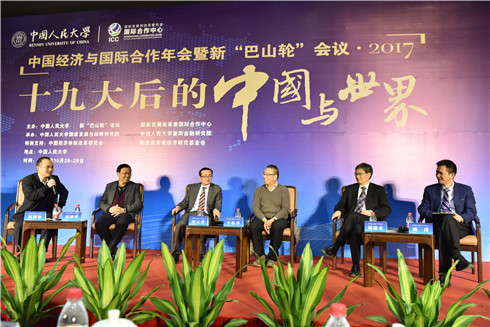
The first session was moderated by Professor Nie Huihua, Deputy Dean of NADS, RUC. In attendance were Prof. Gao Peiyong, Dean of Finance and Economics Strategy Institution of CASS, Prof. Liu Yuanchun, Vice President of RUC, Prof. Ping Xinqiao from School of Economics, Peking University, Prof. Yang Ruilong, Research Fellow at NADS, RUC, and Prof. Yao Yang, Dean of the National School of Development, Peking University. They delivered speeches and discussed the topic of building a modern economic system.
Prof. Gao Peiyong pointed out that the supply-side reform should take the priority in macroeconomic policy and the structural adjustment needs practical reforms rather than simply arranged by policies. Prof. Liu Yuanchun held that the key to socialist market economic system reform is the reform of the government and we should not limit our thoughts of reform in the sphere of market or economy. Prof. Ping Xinqiao stressed the importance of the structural problem in building a new socialist economic system. Meanwhile, Prof. Yang Ruilong explained that we must deal with the relationship between government and market correctly in order to modernize the economic system on the basis of the principles that market-oriented economy should play a decisive role in allocation resources and the government should make more efforts. In the end, Prof. Yao Yang said that we should encourage the shift of people’s thoughts from acquiring wealth through hardworking to enjoying life properly.
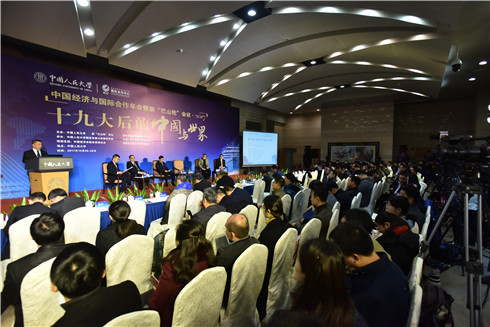
The second session was hosted by Prof. Zheng Xinye, Deputy Dean of School of Economics, RUC, and research fellow of NADS. Prof. Fang Fuqian from School of Economics, RUC, Mr. Li Mingxing, Dean of Study Center and Secretary of the Party committee, SASAC, Prof. Lai Desheng, Dean of Business School, Beijing Normal University, Prof. Chen Shiyi, Deputy Dean of School of Economics, Fudan University, and Prof. Su Jian from School of Economics, Peking University joint the discussion. In this session, participants discussed the two-step strategy in the new era.
Prof. Fang Fuqian held that even though China’s economic growth gradually slowdown in the future due to the enlarged size of the Chinese economy and will possibly decrease to about 4%, it will still be the double of America’s economic growth rate. In this sense, we should insist the goal of two-step strategy. Mr. Li Mingxing pointed out that although colleges and universities are the main sources of innovation, the significance of enterprises should not be ignored and we must focus on the transformation of research and production. Prof. Lai Desheng emphasized the education and development of people which could promote their creativity and ingenuity. Prof. Chen Shiyi said that China's economy has been transitioning from a phase of rapid growth to a stage of high-quality. This means that quality and effectiveness will be the essential indicators of the development of China’s economy. Prof. Su Jian underscored issues such as labor shortage and population crisis.
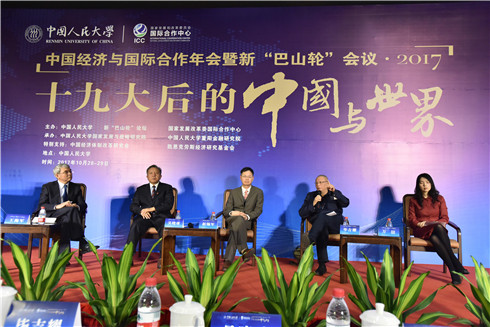
Mr. Wang Haijun, Chairman of the Cairncross Economic Research Foundation, moderated the third session, which in attendance were experts and scholars including RUC Vice President Prof. Wu Xiaoqiu, Prof. Zhao Xijun, Associate Dean of RUC School of Finance, Prof. Bi Jiyao, Deputy Director of the Academy of Macroeconomic Research and Mr. Wan Zhe, Chief Economist at the International Cooperation Center (ICC) of the National Development and Reform Commission (NDRC). The topic of this session is the 10th anniversary of ‘economy crisis’ and global economy.
In Prof. Wu Xiaoqiu’s point of view, the bottom line of China’s economic system reform in the new era should be the prevention of systematic financial crisis. He also mentioned that China needs to balance the economy growth speed and the long-term credit of RMB when trying to globalize its financial system. Prof. Zhao Xijun added that the excessive resources allocation in one single field through leverage is the main cause of financial crisis. Prof. Bi Jiyao stressed that we need to follow the principle that finance should serve economic entity. Mr. Wan Zhe held that the national financial strategy should be adjusted after the 19th National Congress since the expansion of credit finance may be the inner cause of financial crisis.
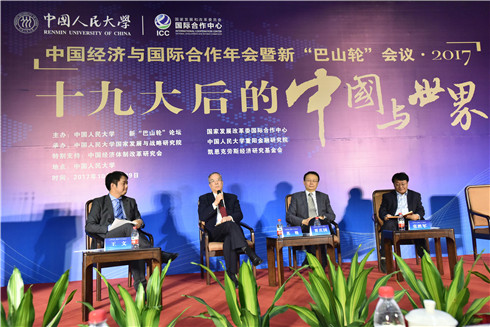
Su Ge believed that the great powers should have greater responsibility for world peace, stability and development. Jia Qingguo said that although global governance requires global participation, the relationship between major powers determines the level and outcome of global governance. Zhang Shengjun pointed out that according to the 19th CPC National Congress, the balance between major powers means that the balance will be attained between international powers represented old order and new era.
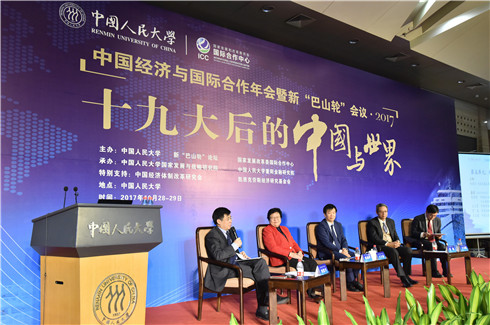
The thematic discussion of Unit 5 was chaired by Deputy Director Liu Jianxing of International Cooperation Center of National Development and Reform Commission. Former Vice Governor Zhang Yanling of China Bank and Senior Fellow of Chong Yang Institute for Financial Studies, Deputy Director Wang Liyong of China Center for Contemporary World Studies, International Department, Central Committee of CPC, Chef Economist Jia Kang of Chian Academy of New Supply-side Economics, Professor Wang Yiwei of School of International Studies and Senior Fellow of Chongyang Institute for Financial Studies made speeches and discussions with the topic of "a community of shared future".
Zhang Yanling said that the idea of "a community of shared future" has rich implications, follow the "peace and development" trend of the times and conform to the common interests of all countries in the world. Wang Liyong pointed out that "One Belt One Road" Initiatives was in line with the fundamentals of "a community of shared future". Jia Kang pointed out that building a community of shared future should combine with reality and supply-side innovation provides driving force for human development. Wang Yiwei analysized this idea from three dimensions and he believed that highlighting the idea of "a community of shared future" in the Report reflects the return of cosmopolitan ideals held by CPC.
The Report pointed out that China faces major strategic opportunities for development and China's economy growth has been transitting from high speed to high quality. Building modern economic system has become the urgent requirement and strategic goals. At the same time, in the face of profound and complicated international environment and dramatic changes experienced by world pattern, thinking on long-term strategy can not be ignored. The "Bashanlun" meeting provides China in the key period of turning driving force with new ideas and new ways of thinking, to change mode of development and optimize the economic structure, further promote the comprehensive reform and make great contribution to meet the goals of "completing the process of building a moderately well-off society in all aspects" and strive to obtain the great victory of socialism with chinese characteristics in new era.